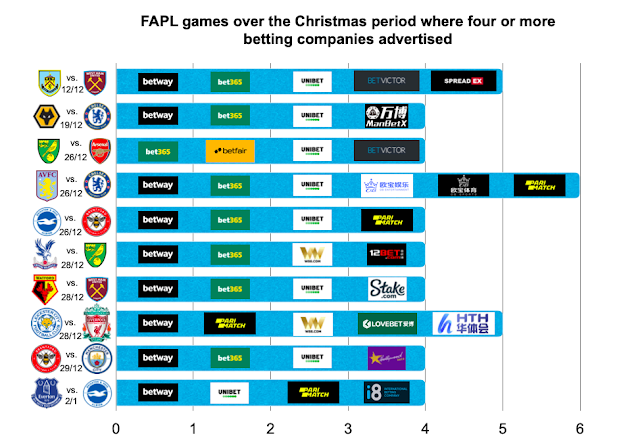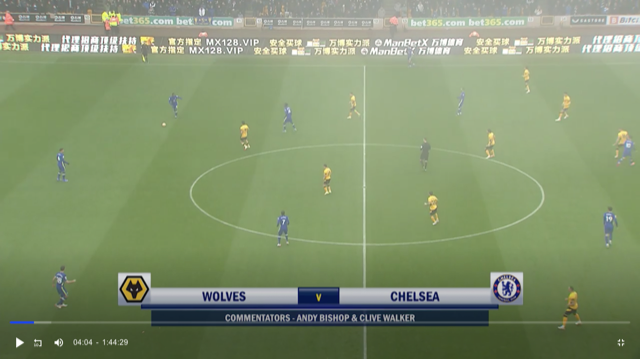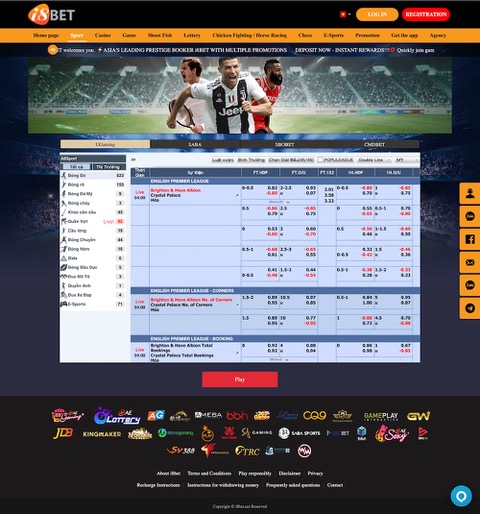In other words, the value of the illegal sports betting market is over three times that of the regulated market. As the UNODC Report notes, organised crime’s involvement in illegal betting is equivalent in value to its involvement in drug, human, or arms trafficking.
Of course, the FAPL wants nothing to do with the illegal betting market, or its connections to criminality. But as we approach the third year of the Covid-19 pandemic, clubs are increasingly desperate for revenue. As such, many could be forgiven for being hypnotised by dollar signs.
Jingle Balls
Twenty six sports betting websites appeared at the 20 FAPL stadiums over the Christmas period. Nine of these 23 betting companies advertised at more than one FAPL game, resulting in 63 separate sports betting company adverts on LED perimeter boards during the 20 game period.
As most LED boards feature a rolling display involving under 15 companies, at some games this involved an almost constant display of gambling advertising during the 90 minutes of on-field play. Some games featured doubly-stacked LED boards equivalent to the height of a player on the TV screen.

Blurred lines
As well as appearing in English, OB Sport’s perimeter advertising at Villa Park also advertised OB.com in Mandarin. The advertised link redirects to www.obao76.com, which is entirely in Mandarin. Online gambling is illegal in China, however it is possible that the site may targeting Mandarin speakers in other countries.
According to a Mandarin disclaimer at the bottom of its homepage, OB.com – or obao76.com – is licensed by the Malta Gaming Authority (MGA), the British Virgin Islands Financial Services Commission, and the Philippine Amusement and Gaming Corporation (PAGCOR). According to the disclaimer, the OB.com brand is owned by Opel Entertainment.
A search through the MGA and PAGCOR internet sites doesn’t reveal any licences granted to OB.com or Opel Entertainment. None of the OB.com domains are listed on the MGA’s list of licensees. This raises questions as to whether the site is licensed at all.
The sports betting company concerned with Chang’s faux pas? Opel Entertainment. The company also owns Oub121.com, again in Mandarin, which has exactly the same site layout as obao76.com and proudly displays its sponsorship deal with Aston Villa at the bottom of the page.
Accessing this website outside of Asia isn’t easy. Once registered using a Chinese mobile phone number, Oub121.com allows users to create a virtual wallet, which can be recharged using crypto currencies, many of which[1] also advertised at FAPL grounds over the Christmas period. Once this is done, a betting window appears which allows users to both watch, and bet on, live sporting events.
As perviously mentioned, online gambling is illegal in China. It would therefore appear that in this particular case, FAPL perimeter LED boards have been used to advertise an application that allows Chinese residents to illegally place online wagers on sporting events.
Opel Entertainment isn’t the only company advertising sports betting to Asian audiences. W88.com is Crystal Palace’s betting partner, and also appeared on the LED perimeter boards at Crystal Palace vs. Norwich and Leicester City vs. Liverpool on 28 December. 12bet also appeared on the LED perimeter boards during Palace’s game against Watford on 28 December, advertising in both English and Mandarin.

At Wolves’ foggy 19 December game against Chelsea, MX128.vip was advertised in Mandarin in doubly-stacked LED boards, with static advertising boards promoting gambling companies appearing above this. The MX128.vip site appears to be inaccessible from the UK, where it redirects to ManBetx.uk.
The licence roulette wheel
So how are companies such as Opel Entertainment allowed to advertise their sports betting OB.com brand in Great Britain if they aren’t licensed there? For nine of the 23 betting brands advertised over the Christmas period, the answer lies with a company based on the Isle of Man.
OB.com’s UK-facing site, www.oubao.co.uk, mentioned that it is ‘powered by’ TGP Europe, which is regulated by Great Britain’s Gambling Commission. The same is true for Fun88.co.uk; SBOtop.co.uk; SportsBetio.co.uk; Stake.uk.com; 12Bet.uk; HTHBet.co.uk; LeyuBet.co.uk; and i8Bet.co.uk.
This lists 31 domains, 14 of which are afforded ‘White Label’ status. This includes the nine betting operators powered by TGP Europe that advertised at Premier League grounds over the Christmas period. ‘White Label’ status allows a company licensed by the Gambling Commission to contract provisions of its licensed activities to third parties.

HTHBet.co.uk is another gambling brand powered by TGP Europe. However at Leicester vs. Liverpool on 28 December and at Manchester United vs. Burnley on 30 December, HTH367.com also advertised in Mandarin. The site now redirects to HTHBet.co.uk but at the time of the match, redirected to a Mandarin version of the site that features the same interface as the Mandarin version of OB Sport’s site[Picture HTH2].
Like obao76.com, HTH367.com mentions that it is licensed by the MGA, PAGCOR, and the BVI Financial Services Commission. Like obao76.com, a search through the MGA and PAGCOR internet sites doesn’t reveal any licences granted to China Experience Technology or HGH. None of the HTH domains are listed on the MGA’s list of licensees.
However at Chelsea’s victory over Tottenham in the Carabao EFL Cup semi-final on 12 January, the Mandarin advertised Fun88 domain had changed to Fun279.com. This links to a Mandarin sports betting application listing Fun88’s shirt sponsorship with Newcastle United and an Asian betting partnership with Tottenham.
Ghost chasing
TGP Europe’s registered address is a small office above a betting shop on the Isle of Man. Google maps reveals that this is an address for a bookmaker.
From such a small base, can TGP Europe be expected to have effective oversight of all the gambling brands promoted by its partners at FAPL grounds? It doesn’t even appear to have effective oversight of its partners.
Another new arrival on the scene is Midnight Gaming, whose W88 brand is Crystal Palace’s sleeve sponsor. As mentioned, it appeared on LED perimeter boards at the London club’s 28 December game against Norwich City; and at Leicester City’s game against Liverpool on the same day.
Companies House lists Midnight Gaming as owned by AliQuantam and a previous company name, Sporting Black Limited. It also shows that Midnight Gaming transferred its address from London to Poole in September 2020. It also confirms that the main company Director is Alan Hilliard Ehrlich.
AliQuantam’s internet site mentions that it is licensed in Malta. However a search of the MGA’s internet site for either AliQuantam, Midnight Gaming, or BR88 again yields no results. An internet search suggests that W88 may be owned by Marquee Holdings, whose shareholders are listed in the Panama Papers.
The analysis above is designed to show the difficulty that FAPL clubs have in establishing who is behind the betting brands that advertise on their shirts and at their grounds. And if top FAPL clubs have difficulty, it can be assumed that the problem is likely to be worse further down the football pyramid. So what do the FAPL and the Gambling Commission have to say about the situation?
Not my job
LED boards are not sold centrally, but some FAPL clubs use third party agencies[2] to sell aggregated minutes via multi-club packages. This perhaps explains why LED perimeter advertising at some stadiums appears to be very similar.
‘Online gambling operators are required to hold a Gambling Commission licence to transact with British based consumers’, read a reply from a Gambling Commission spokesperson to a series of questions. ‘If we find an unlicensed operator acting illegally we will take action. A sports body engaging in sponsorship arrangements with an unlicensed remote operator may be liable for the offence of advertising unlawful gambling if the remote gambling activity isn’t blocked to consumers in Great Britain and that this is clear to consumers.
We’re of the view that the best way for sports bodies to protect themselves against this risk is to ensure that they only promote gambling operators licensed by us. It is for the owner of the advertising space to satisfy themselves that they are not committing the offence of advertising unlawful gambling.’
Most of the betting brands that featured at FAPL stadiums over the Christmas period have a UK-facing site, often licensed through a White Label agreement with a third party. However as shown above, many of these also have overseas facing websites and mobile applications.
Who is responsible for ensuring that all of these overseas facing websites, often advertised in languages other than English, are legitimate? According to the FAPL, the Gambling Commission is responsible. According to the Gambling Commission, the FAPL clubs are responsible.
Of course, it’s perfectly legitimate for FAPL clubs to have legal, regulated Asian betting partners. However this article demonstrates the difficulty that clubs face in assessing who is behind such companies, and in ensuring that such partners are not advertising illegal services in foreign languages. And until the FAPL and British Gambling Commission reassert control over this area, draconian restrictions are a real possibility.
1. AstroPay, which advertises in a video on its gaming page that it is an expert in ‘hard to reach’ markets such as Brazil and India, advertises on FAPL LED boards. BitCi also advertises on FAPL LED boards, as did Socios.com at Crystal Palace’s 28 December game against Norwich, despite a 22 December Advertising Standards Authority ruling that an Arsenal advert for the company breached its Social Responsibility Code. Kyber Network, Alchemy Markets, CorPay and other cryptocurrency products also featured on FAPL LED perimeter boards.
2. We could only find one third party agency used to sell LED perimeter boards at FAPL grounds – Project11.